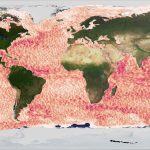 May 27, 2021 11:50 am
Published by Climate Extremes
May 27, 2021 11:50 am
Published by Climate Extremes
In this study, CLEX researchers used aircraft observations from twenty flights during three Austral winters to study the microphysical and reflective properties of shallow convective clouds over the mid-latitude Southern Ocean.
 May 27, 2021 11:31 am
Published by Climate Extremes
May 27, 2021 11:31 am
Published by Climate Extremes
CLEX researchers found the ocean around Antarctica will warm under future emission scenarios, with the level of warming under the high emission scenario almost double that under the medium-low emission scenario.
 May 26, 2021 11:57 am
Published by Climate Extremes
May 26, 2021 11:57 am
Published by Climate Extremes
In a recent CLEX study, published in Climatic Change, researchers discuss the choices taken at each step, which may affect the final outcome and usefulness of extreme event attribution analyses.
 May 6, 2021 1:58 pm
Published by Climate Extremes
May 6, 2021 1:58 pm
Published by Climate Extremes
In this study, CLEX researchers aimed to evaluate the effect of different sources of data and the uncertainties in satellite data, by comparing the data with a ground-based radar product using both location-based and storm-based approaches.
 May 6, 2021 12:35 pm
Published by Climate Extremes
May 6, 2021 12:35 pm
Published by Climate Extremes
Major gaps exist in our understanding of the pathways between the generation and the breaking of internal waves in the Southern Ocean. This has important implications for the distribution of internal wave-driven turbulent mixing, for the sensitivity of ocean mixing rates, and for the representation of ocean mixing in numerical models.
 May 5, 2021 2:02 pm
Published by Climate Extremes
May 5, 2021 2:02 pm
Published by Climate Extremes
Recent studies have debated whether the two types of sudden stratospheric warming – displacement events when the vortex is displaced off the Pole and split events when the vortex splits into two smaller vortices – have differing near-surface impacts.
 May 5, 2021 1:32 pm
Published by Climate Extremes
May 5, 2021 1:32 pm
Published by Climate Extremes
CLEX researchers have constructed the oldest daily historical climate dataset for Perth, southwestern Australia, to provide an extended record for analysing pre‐industrial climate variability and extremes for the region.
 April 30, 2021 12:34 pm
Published by Climate Extremes
April 30, 2021 12:34 pm
Published by Climate Extremes
An international team of researchers performed a systematic evaluation of simulations made by nine FireMIP models in order to quantify their ability to reproduce a range of fire and vegetation benchmarks.
 April 30, 2021 12:16 pm
Published by Climate Extremes
April 30, 2021 12:16 pm
Published by Climate Extremes
Different expressions of El Niño do affect interannual variability in the terrestrial carbon cycle. However, the effect over longer timescales is small. This means the changing frequency of these two types of El Niño events may be of little importance in terms of robustly simulating the future terrestrial carbon cycle.
 April 23, 2021 1:01 am
Published by Climate Extremes
April 23, 2021 1:01 am
Published by Climate Extremes
The discovery of changing eddy energy was made by a team of ANU and UNSW researchers from the ARC Centre of Excellence for Climate Extremes. Their work, published today in Nature Climate Change, shows clear changes to the distribution and strength of these eddies, which had not been previously detected.










